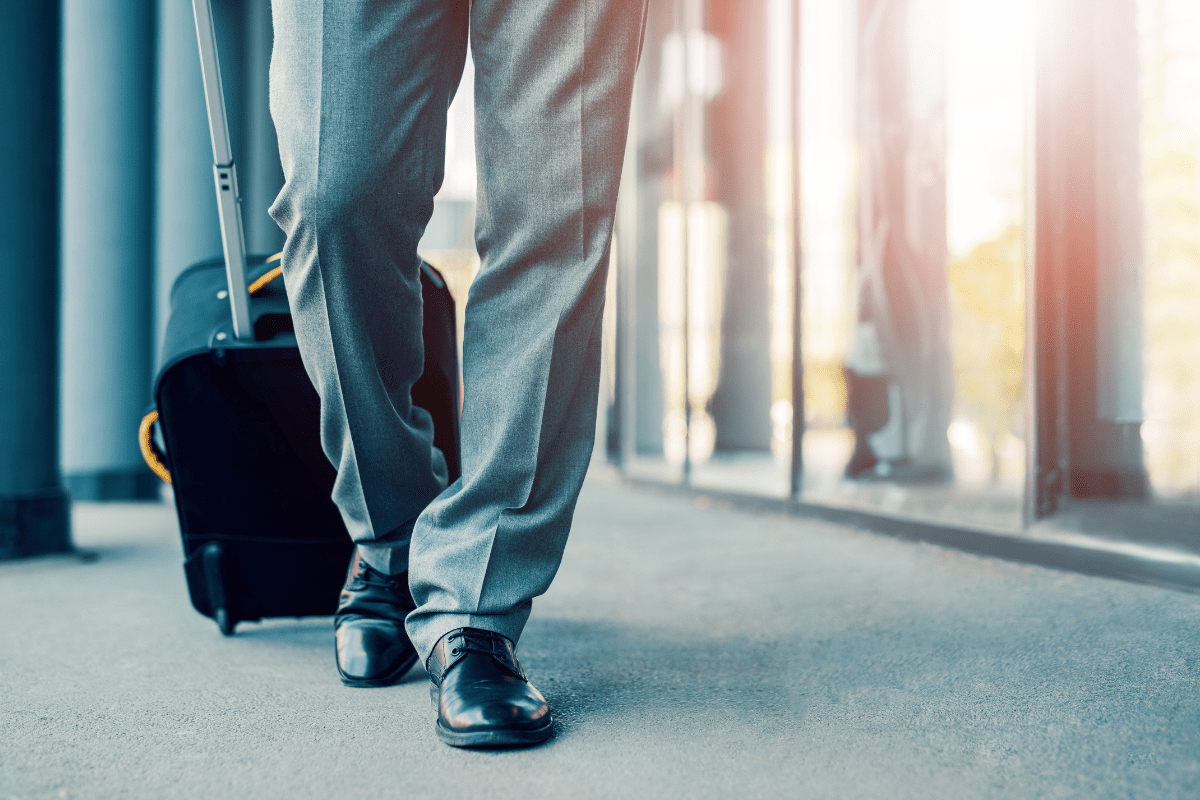
How can you make your business travel both comfortable and cost-effective? Traveling for client meetings, conferences, and training sessions can be tiring, especially when you arrive at your hotel after a long flight and find that the accommodations don’t meet your expectations.
Fortunately, there are several strategies to enhance your travel experience while saving money. From leveraging elite hotel status (VIP Hotel Flights) and airline membership to adopting smart booking practices, these tips will help you maximize convenience and minimize expenses.
Booking Flights and Hotels in Advance
From my experience, airfare and accommodation often constitute the largest expenses in business travel. Booking flights and hotels well in advance can lead to significant savings, especially for international trips.
For example, when I attended a conference in Chicago last year, booking my flight and hotel three months ahead of time allowed me to secure round-trip tickets at nearly 30% off the regular price. Here are a few tips to save on airfare: aim to book flights for Tuesdays or Wednesdays, as these are typically cheaper than weekend flights. Monitor airline websites for promotional offers, and use tools like Google Flights to compare and track prices.
Similarly, booking hotels in advance can help you secure lower rates. Directly booking through a hotel’s official website is often cheaper than third-party sites, which can add extra fees. Hotels such as Marriott and Hilton frequently offer limited-time promotions and double-point deals on their social media channels, so following them can be beneficial. Additionally, some hotels partner with airlines to offer joint discounts, further reducing costs. By planning your travel expenses ahead of time, you can ensure both comfort and savings within your budget.
Joining Airline and Hotel Loyalty Programs
Due to my frequent business trips, I joined both the AAdvantage and Marriott Bonvoy loyalty programs. As a regular flyer, I accumulate miles with each flight, which can be redeemed for free or discounted tickets and even upgrades. Currently, I hold AAdvantage Gold status. This level provides benefits such as priority security screening and boarding, significantly reducing my wait times. This allows me to quickly focus on tasks like replying to emails. Additionally, it offers flexibility with free changes or cancellations if my work plans shift.
For business travelers, hotel stays can often be marred by poor accommodations or inadequate internet speed. As a Marriott Bonvoy Platinum member, I have successfully avoided these issues. I prefer booking hotels with more available rooms, which increases my chances of receiving a complimentary room upgrade and high-quality WiFi. If you frequently stay at the same hotel, fostering a good relationship with the front desk and the manager can make it easier to secure upgrades and late check-outs compared to other members at the same level.
One of my favorite perks as a Marriott Platinum member is the free breakfast and access to the M Club Lounge. These amenities eliminate the stress of finding meals during busy work periods. Among the Marriott hotels I’ve stayed at, some M Club Lounges offer a remarkable variety of food and excellent facilities. For example, the Sheraton Centre Toronto made a lasting impression with its impressive pool. However, due to the pandemic, many hotels have closed their M Club Lounges, and website information can sometimes be outdated. It’s a good idea to call the front desk before booking to confirm the current status.

A quick way to achieve Marriott Platinum status is through the VIP Hotel Flights website. I purchased their Marriott Bonvoy Platinum Elite status and was upgraded within a week without any issues. This status is valid for two years, and their services are highly reliable due to their partnerships with major companies.
Friendly reminder: Only bookings made directly through the Marriott official website and paid individually (not billed to a master account) count towards qualifying nights and points accumulation. Bookings made through third-party online travel agencies (like Expedia) do not count. It’s advisable to check with your company or travel agency before making travel arrangements.
Avoid Checked Baggage
Business trips often have packed schedules, and sometimes work and travel plans may conflict, or you might suddenly add a new destination. In such cases, carrying excessive luggage can make you feel exhausted during transfers and moving between locations.
Therefore, I usually bring only essential travel items and important work documents. My main items include:
- 1-2 sets of business attire
- 2-3 sets of casual clothing
- Shoes
- Business cards
- Notebook
- Pen
- Personal identification and passport
- Laptop
- Mobile phone
- Bluetooth headset
- Chargers
- Travel-sized toiletries and grooming products
- Sleep mask
- Earplugs
- Portable U-shaped pillow
- Water bottle
- Cash and credit cards
Keeping your luggage minimal can help avoid the hassle of checking in baggage, the risk of losing luggage, and extra costs. Additionally, it provides more flexibility when choosing flights. Be aware that different airlines have varying requirements for carry-on luggage sizes, so it’s best to check these requirements in advance.
Easy Jet Lag Solutions
International or intercontinental business trips often come with the challenge of adjusting to different time zones. Insomnia and fatigue can make it hard to concentrate on work or enjoy sightseeing. Some travelers recommend adjusting to the destination’s time zone by either going to bed early or staying up late before the trip. However, this strategy can be difficult for those who work daily. Therefore, whenever possible, I book flights that depart and arrive in the evening. This approach helps me adapt to the new time zone more quickly.
If evening flights aren’t an option, I ensure I get ample sleep the night before traveling. On the plane, I adjust my sleep schedule according to the destination’s time. For instance, if flying from London to New York with an arrival time of noon in New York, I might sleep for a maximum of 2 hours during the flight and stay awake for the rest of the journey.
Many travelers mistakenly believe that drinking coffee to stay alert or consuming alcohol to aid sleep during the flight is effective. In reality, caffeine and alcohol can disrupt your circadian rhythm, making it harder to adjust to a new time zone. Instead, I stay active by moving around every hour or listening to an audiobook. For better sleep, I use essential oils for facial and neck massages or listen to white noise.
After arriving in New York, I give myself a full day to adjust to the new time zone. I ensure I get plenty of natural light, stay hydrated, and engage in light exercises, such as jogging. This helps speed up the adjustment process. If I’m extremely tired during the day, I take a short nap of 20-30 minutes, avoiding deep sleep to prevent difficulties sleeping at night.
Business Travel Hotel Selection Tips
Business trips require balancing work and travel. Therefore, when choosing a hotel, it’s important to consider several factors: location, room comfort, soundproofing, high-quality WiFi, office facilities, and dining services.
I usually use platforms like Booking.com to check the hotel’s location, amenities, and ratings. I also read numerous detailed reviews to understand the real guest experiences. By examining both positive and negative reviews, I can assess the value of the feedback and determine whether I can tolerate the worst-case scenarios, such as infrequent cleaning. No hotel is perfect, but you should avoid those that could be unbearable, such as one that’s a 2-hour drive from the meeting location or has poor soundproofing. Even if the room rate is attractive, a bad hotel can significantly ruin your travel experience. It’s a good idea to prioritize the ratings and criteria that matter most to you before booking.
In addition to the overall stay experience, consider other factors like cancellation policies, room prices and discounts, conference facilities, and leisure amenities. Hotels that offer flexible cancellation or check-in times can better accommodate unexpected changes in your work schedule. Booking directly through the hotel’s website can sometimes be more cost-effective than using third-party platforms. This is especially true if you are a member of the hotel’s loyalty program, which often provides lower rates and discounts. Amenities such as executive lounges and multimedia meeting rooms can also facilitate business meetings and negotiations.
Cost-Effective Transportation Tips
Airport and hotel parking fees can be quite steep. Unless absolutely necessary, I usually opt for public transportation or ridesharing services. For short distances, shared bikes are often more convenient than renting a car. Then for extended stays or frequent trips to a particular city, consider purchasing a local transit card. For example, I use a MetroCard in New York, which is more economical than buying single bus or subway tickets.
Many major cities offer discount cards for travelers. For instance, the Paris Visite card provides unlimited public transportation within Paris and nearby areas for a set number of days. These cards are typically valid for 1 to 5 days, making them ideal if you plan to visit several attractions in a short time.
If your company has partnerships with car rental agencies, renting a car might be a viable option, potentially offering additional discounts. To avoid high taxes and fees associated with airport rentals, compare prices using apps like Uber before booking. Additionally, check if nearby hotels provide complimentary shuttle services to the airport.
Efficient Planning for Business Travel
Balancing work and travel on business trips can be tough. I prefer to focus on work within a set timeframe, and then enjoy local cuisine and sightseeing without stress. When time is limited, I seek out local events like performances, festivals, or night markets to explore during the mornings or evenings.
Effective time management is crucial, so I plan ahead by researching attractions and entertainment options on TripAdvisor. A detailed itinerary, including transportation, opening hours, and ticket options, is helpful. To avoid long lines, it’s best to book tickets or fast-track passes in advance. Alternatively, sightseeing buses provide a quick way to see popular spots, though they offer less flexibility.
If you’re into food, follow travel bloggers for street food and restaurant recommendations. Asking locals for dining suggestions is also a great way to discover excellent local eateries.
Conclusion
Business travel offers a unique opportunity to unwind and explore new cultures beyond the workday. By applying these practical and budget-friendly travel tips, you can make the most of your trips without overspending or wasting time. Whether you’re navigating a bustling city or soaking in the local sights, these strategies will help you stay refreshed and focused. Embrace the adventure and enjoy every moment of your journey!

